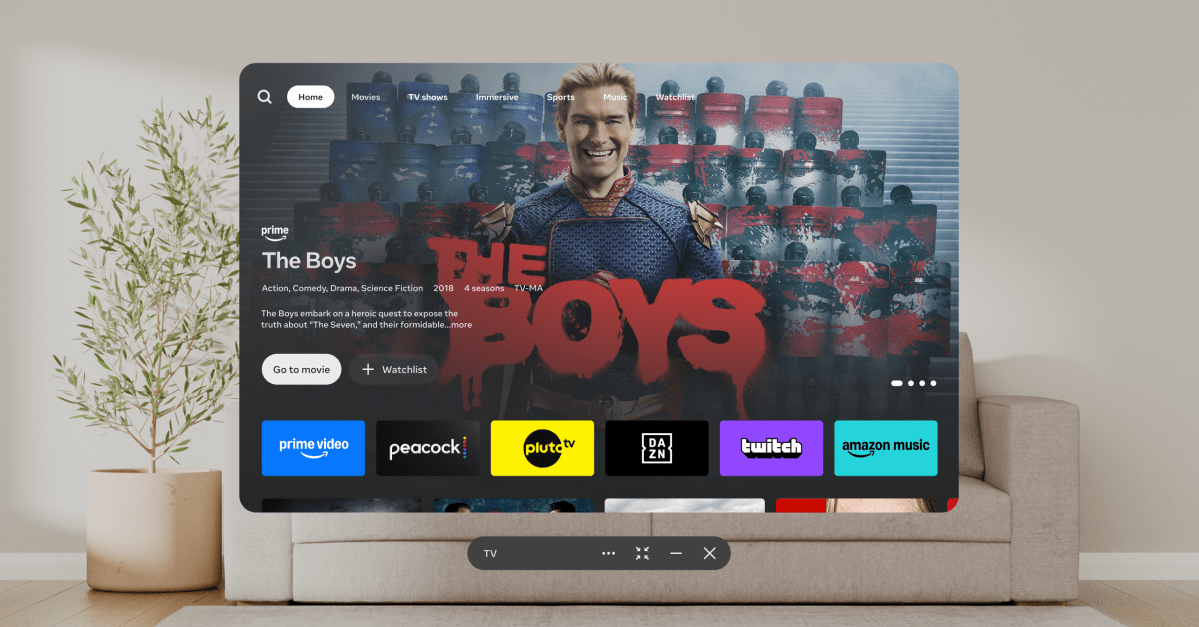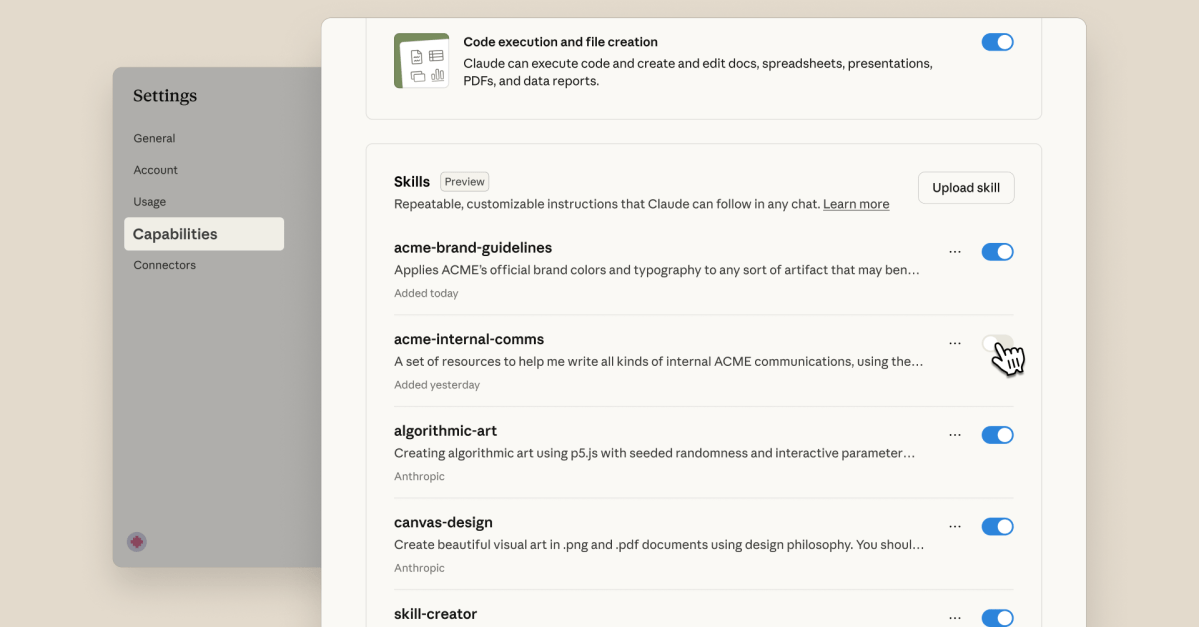This is Lowpass by Janko Roettgers, a newsletter on the ever-evolving intersection of tech and entertainment, syndicated just for The Verge subscribers once a week.
Big hero images highlighting select TV shows and movies, a row of app icons, a bunch of additional content recommendations: At first glance, Meta’s new Horizon TV app looks a lot like the homescreen of your typical smart TV. Something Samsung, Google, or Amazon would ship on their devices.
Except Horizon TV isn’t running on a TV or streaming stick, but on the company’s Meta Quest headsets. Unveiled at Meta Connect last month, the app is a big part of Meta’s push to attract older, less gaming-focused audiences to VR — a push that also includes a partnership with James Cameron, and investments into sports, and other types of leanback entertainment content.
Re-creating the smart TV experience in virtual reality also represents a monetization opportunity for Meta, which has for some time now tried to figure out how to bring advertising to VR. However, the approach also means that Meta is inheriting some of the very problems smart TV platform operators have struggled with for a long time. And if consumers do warm up to watching more content with their headsets, they’re bound to realize that even in VR, you can’t escape the collateral damage of the streaming wars.
Meta finally built Zuck’s TV app
In 2017, Mark Zuckerberg made headlines when he predicted that AR and VR wearables would eventually make traditional TVs obsolete. “Instead of a $500 TV sitting in front of us, what’s to keep us from one day having it be a $1 app,” he told The New York Times at the time, suggesting that a digital TV, beamed into your living room with a headset or glasses, may one day be just as good, if not better, than the real thing.
Eight years later, Meta launched its closest attempt yet to make that vision come true: Horizon TV, the latest revamp of the Quest’s native video app, does look a lot like your typical smart TV screen. That’s no accident: “We absolutely have taken inspiration from the navigation systems that have come before,” says Meta Reality Labs director of entertainment content Sarah Malkin. “We want customers to feel a sense of familiarity.”
Like many smart TV UIs these days, Horizon TV is what’s known among streaming insiders as content-forward. Instead of just listing a bunch of app icons, it deep-links directly into these apps and features content recommendations for individual shows, movies, and livestreams.
Most of the content featured in the Horizon TV app is sourced from just a handful of partners, including Amazon, Pluto, and Peacock. There are also app icons for YouTube, Spotify, and DAZN, among others; Disney Plus and ESPN are supposed to launch on Horizon TV soon. Netflix, Hulu, and HBO are notably missing, as are a bunch of free video services like Tubi and The Roku Channel. There are also no ad-supported linear streaming channels yet, and no option to rent or purchase movies or directly subscribe to video services within the Horizon TV app.
Not yet, anyway. Malkin tells me Meta doesn’t have anything to announce on that front, but the company is definitely looking at such features. “Our goals are really to support and provide additional outlets for the existing business models of the entertainment industry to thrive,” Malkin says.
Embracing existing smart TV business models provides Meta with an opportunity to eventually make some money with Horizon TV. Smart TV makers regularly demand a cut from ad and subscription revenue generated on their platforms. Roku, for instance, now generates close to $1 billion per quarter with such fees, and its own ads and services.
However, smart TV operators also often have contentious relationships with publishers. One example: Google launched its Google TV platform five years ago with a content-forward UI that looks similar to what Meta is now embracing. In those five years, the company has been unable to come to an agreement with Netflix to fully integrate into that UI, which is why Google TV owners still can’t add Netflix shows to their Google TV watchlist.
No more UGC, but a lot more sports
Meta will undoubtedly face similar challenges with Horizon TV — and get blamed for it by its users, some of which are already unhappy with recent changes.
Prior iterations of the TV app, which was rebranded multiple times over the years, also put a heavy emphasis on user-generated 180-degree and 380-degree content. Meta booted all UGC from the app last month, telling creators to upload their clips to YouTube instead. One reason is to make sure that VR newcomers don’t get whiplash from shaky amateur footage. “If you have a negative experience with any sort of immersive technology, that is very off-putting and difficult to return from,” Malkin says.
Horizon TV does still feature some animated UGC created with Quill and similar tools, thanks to a partnership with the Theater Elsewhere app. Those titles are part of a broader “immersive” section, which also offers access to 180-degree video documentaries and Meta-produced content like the VR show The Faceless Lady.
The most interesting immersive content listed in this category is Blumhouse Enhanced Cinema, which is a special VR rerelease of M3GAN and The Black Phone. Both movies play in a special mixed reality environment that extends what’s happening on screen into your living room, with your walls suddenly becoming part of a creepy forest, a spinning bottle materializing on your floor, and creepy creatures appearing out of nowhere.
With all those different formats, immersive video on Horizon TV still feels a bit like a hodgepodge. However, Meta sees this kind of content as a way to one-up traditional TV. “I want to get to a place where the fundamental media consumption experience inside of a Quest feels so differentiated from what you can do on any other flat screen that it’s the obvious way to watch something,” says Meta’s metaverse VP, Vishal Shah.
Part of those efforts will be a lot more 3D content, including from James Cameron’s Lightstorm Vision production outlet. The company also seems to be particularly interested in live sports. Meta already has a partnership with the NBA to show games from a courtside perspective. Sports streaming service DAZN, which is also integrated into Horizon TV, has been showing soccer games with a tabletop view in VR. Referencing both, Malkin tells me that the company plans to announce new partnerships, and new ways to watch that type of content, in the future.
Sports, with its complex and expensive distribution rights, is another area that has vexed other streaming companies and smart TV platforms for years. Still, Meta believes it has a shot, thanks to its existing relationships with leagues and other partners. “It’s a challenging landscape, and an increasingly fragmented one,” acknowledges Malkin. “It’s of course hard. But if it weren’t hard, it wouldn’t be worth doing.”
















Leave a Reply